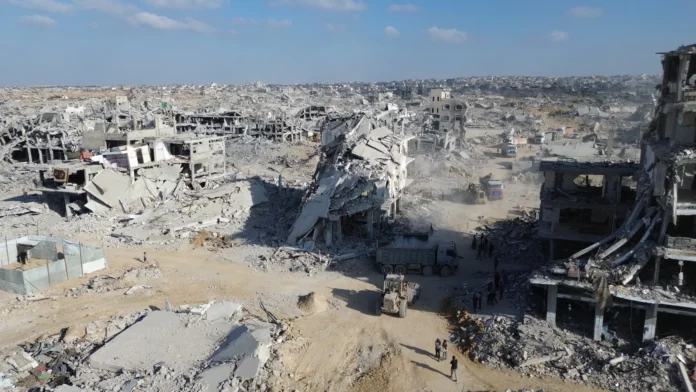Gaza City: Tensions in the Middle East flared once again as Israel broke the ceasefire agreement and launched a series of airstrikes on Gaza early Wednesday morning, targeting what it described as “militant infrastructure.” The attacks mark a resumption of hostilities after several weeks of fragile calm following international mediation efforts.
According to local reports, multiple explosions were heard across northern and central Gaza, with Israeli fighter jets striking several residential areas. The Palestinian Health Ministry claimed that at least 18 people, including women and children, were killed in the latest bombardment, while dozens were injured.
“Israel’s aggression has once again violated international humanitarian law,” said a spokesperson for the Palestinian Authority, condemning the attacks as “a deliberate attempt to derail peace efforts.”
The Israel Defense Forces (IDF) confirmed the strikes, stating they were in response to rocket fire launched from Gaza late Tuesday night. The IDF said its operations targeted Hamas command centers, weapons storage sites, and tunnel networks, emphasizing that the military “will continue to defend Israeli citizens against terrorism.”
Ceasefire Collapse
The latest escalation effectively ends the ceasefire that had been brokered last month by Qatar, Egypt, and the United Nations, following weeks of negotiations. The truce was seen as a critical step toward stabilizing the region after months of intense fighting that left thousands dead and displaced.
However, analysts say the ceasefire had been tenuous from the beginning, with sporadic violations from both sides and mounting political pressure within Israel to respond to militant provocations.
Humanitarian Crisis Deepens
Gaza’s healthcare system, already stretched by months of bombardment, is now struggling to cope with the new wave of casualties. Local authorities report severe shortages of medical supplies, electricity, and fuel, raising fears of a deeper humanitarian crisis.
“Hospitals are overflowing. There are no safe zones left in Gaza,” said Dr. Samir al-Haddad, a physician at Shifa Hospital.
International aid organizations, including the Red Cross and UNRWA, have called for an immediate cessation of violence and safe passage for humanitarian convoys.
Global Reactions
The international community reacted swiftly to the renewed fighting. The United Nations Secretary-General expressed “deep concern” over Israel’s actions, urging both parties to “exercise maximum restraint.” The European Union and United States called for the restoration of the ceasefire and protection of civilians.
Meanwhile, large-scale protests erupted in London, Istanbul, and Amman, with demonstrators condemning what they described as Israel’s disproportionate use of force.
Political Implications
Political observers note that the renewed violence comes at a sensitive time for Israeli Prime Minister Benjamin Netanyahu, who faces growing domestic criticism over security failures and international pressure for restraint.
In Gaza, Hamas officials vowed retaliation, declaring that Israel “will pay a heavy price for this aggression.” The group also accused international mediators of failing to hold Israel accountable for ceasefire violations.
As diplomatic efforts intensify to prevent a full-scale conflict, the situation in Gaza remains volatile, with fears that another prolonged war could erupt — deepening the cycle of violence and humanitarian suffering that has defined the region for decades.



